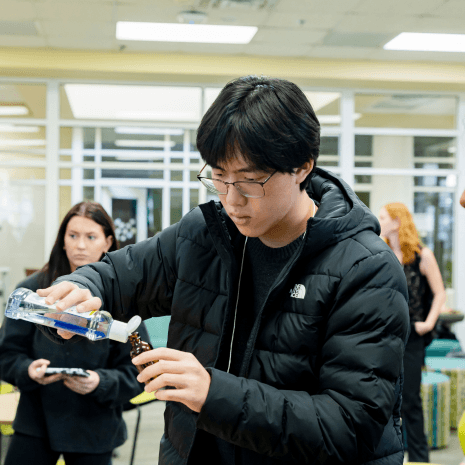The University of South Carolina is celebrating a successful day of learning, hands-on workshops and service at the first Student Sustainability Summit on February 21, 2025. Hosted by the Office of Sustainability and volunteers from Sustainable Carolina, the event welcomed 66 students to Green Quad, the university’s first LEED-certified building.
“Our summit far exceeded expectations in terms of engagement — from attendees and presenters to volunteers,” Associate Director for Sustainability Jessie McNevin said. “This summit is a perfect example of how student perceptions of leadership have evolved. It was once believed that leadership was defined by holding a microphone or having a fancy title. Today’s students are less interested in titles and more focused on finding programs that empower them to advocate for what they believe in.”
The summit included a series of student-led workshops beginning with 101 sessions on sustainability and environmental justice. Students then chose to attend discussion-based and hands-on workshops about upcycling, fast fashion, how to talk about sustainability with children and more.

“Sustainability is for everyone,” said Katie Poer, Sustainable Carolina’s project coordinator for campus outreach and one of the presenters for the Sustainability 101 workshop. “It’s how we are going to continue to go forward as a society, and I like to highlight the power of the individual and that our choices have impact.”
Raeva Bali, who serves as the undergraduate program assistant for the Office of Sustainability and presented at the environmental justice workshop, said it’s important for students to have discussions about sustainability now because of its wide reach, and environmental justice is a growing part of those conversations for local communities.
After the workshops, attendees participated in four service projects, including disposing of four large trash bags worth of litter left around USC’s campus. In the Gamecock CommUnity Shop, volunteers helped organize donations to support individuals experiencing basic needs insecurities. Participants also packaged 1500 milkweed seed packets for South Carolina residents to plant in their yards to encourage growth of the monarch butterfly population and planted two fruit trees in the Sustainable Carolina Garden.
By taking part in the summit, attendees were able to check off most of the five requirements of USC’s new Eco Ambassadors Program: Attend a 101 workshop, volunteer in the Sustainable Carolina Garden, participate in a discussion workshop, take part in a hands-on workshop and serve in the community.
“Eco Ambassadors gets students involved in sustainability, regardless of major, and to see how accessible it is. It’s an honor students can earn by completing five distinctions, and then they get to show to future employers and to their communities that this is a badge of honor, and they care about their surroundings,” Bali said.
The Summit was funded through a grant by the Central Midlands Council of Governments, as part of their Climate Pollution Reduction Planning Grant received by the U.S. Environmental Protection Agency (EPA). The Office of Sustainability connected with this initiative through the grant’s program manager, Jory Fleming, who also serves as an adjunct faculty member within USC’s Geography Department and the South Carolina Honors College.
“We learned about the grant at one of the events during Climate Resiliency Week — which we planned collaboratively with the S.C. Department of Environmental Services. It's a classic example of how one collaboration can snowball into more collaborations and more sharing of resources. Our office is often on the lookout to connect ideas, resources and people to move USC and Columbia forward in sustainability efforts,” McNevin said.
Sustainability efforts also extended to the summit’s lunch — which used reusable ceramic plates rather than disposable paper plates and plastic utensils. The Office of Sustainability is also partnering with several units on campus to launch Garnet Bites, which will provide convenient and immediate notifications of available food on campus after a catered event.
Students can continue to get involved in sustainability efforts at USC by volunteering in the Sustainable Garden and completing the Eco Ambassadors Program, which is recognized on the Office of Sustainability page of USC’s website.